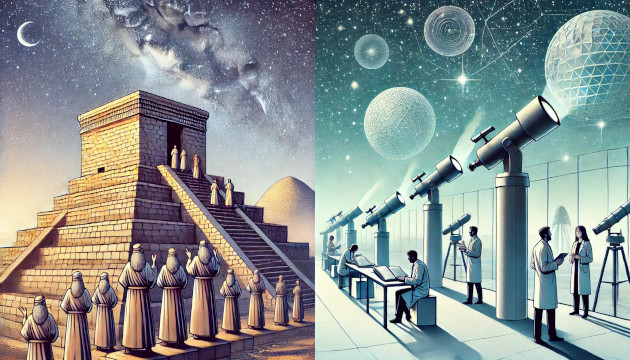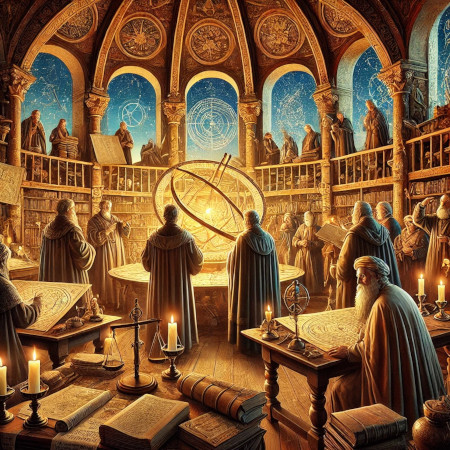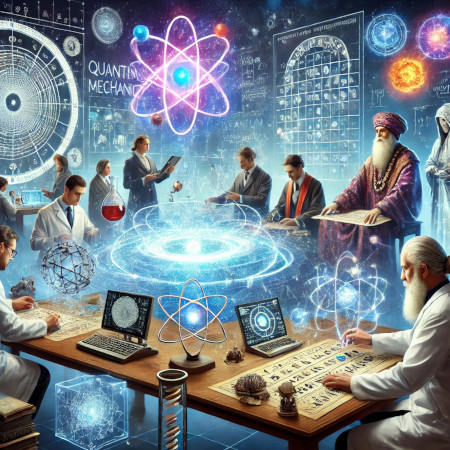Astrology vs. Astronomy
Exploring Two Different Approaches to the Cosmos
While astrology and astronomy both originated from humanity’s fascination with the stars, they have evolved into two distinct fields with different approaches and goals. Understanding their differences helps us appreciate how each offers a unique perspective on the universe.
Astrology is often described as an all-encompassing science that considers both the physical and spiritual nature of the cosmos. It is based on the idea that celestial bodies - like the planets and stars - not only influence earthly events but also have a profound impact on human consciousness, emotions, and fate. For astrologers, the universe is alive with meaning, connected through a cosmic web that links the macrocosm (the universe) with the microcosm (the individual). Astrology delves into the spiritual dimensions of existence, offering insights into personality, destiny, and the nature of the soul. It has been practiced for thousands of years and is deeply rooted in the spiritual traditions of many cultures, such as those of ancient Egypt, Babylon, India, and Greece.
Astronomy, on the other hand, is a science that focuses strictly on the physical study of celestial objects and phenomena. It involves observing, measuring, and understanding the physical properties and behaviors of stars, planets, galaxies, and other cosmic entities. Modern astronomy, in its current form, has been shaped since the 19th century by a materialistic approach that excludes spiritual or metaphysical interpretations. Astronomers use advanced technology, such as telescopes, satellites, and computer models, to study the universe and its origins, from the Big Bang to the formation of black holes. Astronomy is a branch of science that relies heavily on empirical evidence, experimentation, and the scientific method.
In summary, the key difference lies in their scope and perspective:
- Astrology considers the universe as a living, interconnected system that includes both material and spiritual dimensions. It seeks to understand how cosmic events reflect or influence human life, using a blend of observation, symbolism, and spiritual insight.
- Astronomy focuses solely on the material aspects of the cosmos, aiming to explain the mechanics and origins of celestial bodies and phenomena through empirical study and scientific analysis.
While astrology looks for meaning and connection between the cosmos and human experience, astronomy aims to objectively study and explain the universe's physical properties. Both fields stem from humanity's age-old curiosity about the stars, but they offer different paths to understanding our place in the vast expanse of the cosmos.
The War on Astrology: Why Is There a Trend to Dismiss It?
In recent times, there has been a growing trend to dismiss astrology, often labeling it as "unscientific" or merely a pseudoscience. But why is there such a push to disregard a practice that was integral to the development of our entire civilization?
For thousands of years, astrology was deeply woven into the fabric of human culture and society. From ancient Egypt to Babylon, from India to Greece, and across the Americas, astrology was a central part of how people understood the world. Our ancestors looked to the stars to navigate their lives - whether it was determining the best time to plant crops, building monuments aligned with celestial bodies, or interpreting the deeper meanings of human existence.
Many of the world’s architectural wonders and historical monuments are aligned with astrological principles. The pyramids of Egypt are aligned with the Orion constellation; Stonehenge is oriented to mark the summer and winter solstices; the Mayan and Aztec temples in Central America were built to correspond with the movements of the sun, moon, and planets. Even entire cities, like Washington D.C., were designed with specific astrological alignments and symbolism in mind.
Despite this rich history, astrology has faced growing skepticism, especially in the modern era. Since the 19th century, there has been a shift toward a purely materialistic view of the universe - one that dismisses anything that cannot be measured, quantified, or observed through scientific instruments. This shift, driven largely by the rise of modern science, has led to the exclusion of astrology from academic and scientific circles. It has been labeled as superstition or mere entertainment, and its spiritual or symbolic meanings have been largely overlooked.
But this "war on astrology" ignores the fact that our understanding of time, seasons, and cosmic cycles - and even the development of early sciences like mathematics and astronomy - was heavily influenced by astrological practices. Astrology was not only about predicting events but also about understanding the deeper connections between the cosmos and the human experience. It offered a way to make sense of life's mysteries and our place in the universe.
So why is there such resistance to astrology today? Perhaps it challenges the purely rational, materialistic worldview that dominates modern thought. Astrology suggests that there might be forces and patterns at work in the universe that we do not fully understand - forces that connect the stars, planets, and human consciousness in ways that go beyond what current scientific methods can measure.
Instead of dismissing astrology, perhaps we should ask why this ancient practice, which has influenced so much of our history, continues to captivate people around the world. Is it because it speaks to something deeper - a desire to understand the cosmos, our purpose, and the unseen connections that shape our lives?
Why Was Natural Philosophy Ridiculed After the 19th Century?
Natural philosophy, or philosophia naturalis, was once the foundation of all scientific inquiry. It was the study of nature and the physical universe, encompassing what we now call physics, chemistry, biology, and astronomy. However, unlike modern science, natural philosophy was not solely concerned with the material world; it also embraced metaphysical questions, integrating spiritual, ethical, and philosophical dimensions into the understanding of reality.
So, why did natural philosophy fall out of favor after the 19th century? Why did this ancient, holistic approach to knowledge become increasingly ridiculed and replaced by a purely materialistic and atheistic framework known today as modern science?
The shift began in the Age of Enlightenment and accelerated through the 19th century. During this period, scientific thinking underwent a dramatic transformation. The focus moved away from a holistic understanding of the universe - one that included both the material and the spiritual - and toward a more rigid, empirical, and materialistic approach. In this new model, only what could be measured, tested, and quantified was considered “real” or “scientific.” This shift culminated in the development of modern science, which became increasingly secular and skeptical of anything that couldn't be empirically proven or observed.
Natural philosophy, with its integration of metaphysical questions and spiritual considerations, was increasingly viewed as "unscientific" because it did not conform to the new, more narrow definition of science. As a result, many ancient sciences and holistic approaches to understanding the world were dismissed or ridiculed.
One of the key reasons for this shift was the growing influence of figures like Isaac Newton, who, despite being deeply spiritual himself, laid the groundwork for a more mechanistic view of the universe. Newton’s laws of motion and universal gravitation suggested that the universe operated like a giant machine, governed by fixed laws of nature. Over time, this mechanistic view overshadowed the spiritual dimensions that had been central to natural philosophy.
The rise of materialism also played a major role. With the advent of industrialization and technological progress, society began to prioritize practical, tangible results. The materialistic worldview, which sees matter as the fundamental substance of reality, began to dominate. This perspective sought to cut “God” or any spiritual principles out of the equation, viewing the universe as a self-sufficient, closed system.
By the 19th century, the intellectual landscape was dominated by this materialistic approach, leading to the marginalization of natural philosophy. Philosophers, alchemists, and astrologers - who once explored the deeper, metaphysical aspects of existence - were now often dismissed as “unscientific.” The focus was solely on observable phenomena and measurable facts, with little room for spiritual or philosophical interpretations.
However, this shift also had its limitations. By excluding spiritual and metaphysical considerations, modern science cut itself off from a broader understanding of the universe. The reduction of reality to what can be measured and quantified leaves out questions of meaning, purpose, and consciousness - questions that natural philosophy always sought to address.
Today, there is a growing interest in revisiting these older, holistic ways of knowing. As we confront new challenges - such as understanding consciousness, grappling with the mysteries of quantum physics, and recognizing the interconnectedness of life - there is a sense that perhaps we need to bring the "God" part back into the equation, or at least open up to the possibility that the universe is more than just a machine.
In short, the ridicule of natural philosophy after the 19th century reflects a broader shift in human thought, one that prioritized the material over the spiritual, the measurable over the meaningful. But as science continues to evolve, there may yet be room for a renewed dialogue between the physical and metaphysical, the seen and the unseen, the measurable and the mysterious.
The Future of Astrology: Will Quantum Mechanics Validate Ancient Wisdom?
Astrology has always been a bridge between the material and the spiritual, a way to understand the deeper connections between the cosmos and human life. But as we move further into the 21st century, there’s a growing possibility that modern science - specifically, quantum mechanics - may offer new insights that validate what ancient traditions have long understood.
Quantum mechanics, the branch of physics that studies the behavior of subatomic particles, has already revealed some strange and unexpected truths about the nature of reality. It suggests that the universe is not as straightforward and predictable as classical science once believed. At the quantum level, particles can exist in multiple states at once, can be "entangled" across vast distances, and can change their behavior based on observation - ideas that challenge our very understanding of existence.
What if these concepts, still being explored by physicists today, actually align with the knowledge preserved in ancient traditions? Traditions like Hermeticism and Vedic teachings have always spoken of a universe that is interconnected, where everything is part of a greater whole, and where the mind and spirit play a crucial role in shaping reality. These philosophies propose that the material and spiritual worlds are not separate but intertwined - a concept that resonates with the emerging findings of quantum mechanics.
For example, the principle of "as above, so below" in Hermeticism suggests that what happens on a cosmic level mirrors what happens on a personal level. This reflects the idea of entanglement in quantum mechanics, where particles separated by vast distances can instantaneously affect one another, implying a fundamental interconnectedness that defies our usual understanding of space and time.
Similarly, the Vedic traditions of ancient India speak of consciousness as the primary force in the universe, with the material world being a manifestation of this cosmic consciousness. Quantum theories, which propose that consciousness could be a fundamental element of reality, seem to echo these ancient ideas. Some interpretations even suggest that the observer plays an active role in determining the outcome of quantum events, implying that mind and matter are deeply connected.
If quantum mechanics continues to reveal that the universe operates in ways that align with ancient spiritual wisdom, it could spark a profound re-evaluation of astrology and other metaphysical sciences. Astrology, which has long been dismissed by the modern scientific community, might find new relevance and credibility. It could be understood as a symbolic language that describes the subtle energies and connections between the cosmos and human experience, using the positions and movements of celestial bodies as its guide.
In the future, we may find that astrology and quantum mechanics are not so different after all. Both seek to understand the fundamental patterns and forces that shape reality - one through ancient symbols and archetypes, the other through equations and experiments. If these paths converge, we could witness a renaissance in how we understand the universe, combining the insights of modern science with the wisdom of our ancestors.
It would not be surprising if, in the coming years, quantum mechanics confirms much of what ancient traditions like Hermeticism or Vedic philosophy have always said: that the universe is a living, interconnected web of energy, consciousness, and matter. This could open the door to a new era of understanding, one that honors both the measurable facts of science and the profound mysteries of the spiritual.
As we stand on the brink of this potential convergence, the future of astrology looks bright - not as a relic of the past, but as a bridge to a deeper, more holistic understanding of the cosmos.



